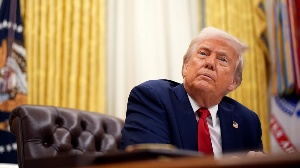- Home - Entertainment
- Lifestyle News
- Year In Review
- Music News
- Entertainers
- Entertainment Archive
- Entertainment Photos
- Jokes
- Entertainment Headlines
- Ameyaw Debrah
- Brown GH
- Celebrities Buzz
- GH Base
- Ghana Celebrities
- Gh Gossip
- GH Page
- GH Splash
- Hot Gossip GH
- YEN
Television of Thursday, 10 April 2025
Source: www.ghanawebbers.com
Trump steps back from cliff edge of all-out global trade war
For days, Donald Trump and his White House team insisted on new tariffs. They claimed these "reciprocal" tariffs would apply to many countries.
On Tuesday, a report suggested a 90-day pause. This news briefly boosted the stock market.
Now, that pause is real, with some exceptions. The global economic order is on hold. Trump's promise of a manufacturing boom will have to wait.
The White House stated that pausing tariffs was part of their plan. They aim to negotiate with individual countries afterward.
Treasury Secretary Scott Bessent said over 75 countries contacted them. He expected even more after the announcement.
This framing from the White House is not surprising. Investor panic and criticism from Republicans preceded this decision.
Was this a strategic retreat or part of Trump's negotiation strategy?
Trump's aides quickly celebrated the president's move. Trade adviser Peter Navarro said everything unfolded as planned.
Press secretary Karoline Leavitt told reporters they misunderstood Trump's actions. "The entire world is calling the United States," she said.
Details about the tariff suspension were unclear at first. Did it include the EU? What about Mexico and Canada?
For hours, trading partners scrutinized Trump's Truth Social post for answers. Reporters shouted questions during press gaggles for clarification.
On Wednesday afternoon, Trump acknowledged market concerns. He noted that people were feeling uneasy about the situation.
Earlier, he urged people to "BE COOL!" on Truth Social. On Monday, he criticized those who panicked as "weak and stupid."
In the end, Trump changed course abruptly but insisted it was necessary. He blamed economic disruptions on long-standing issues in the American economy.
Democrats painted a different picture of his actions. Senate Minority Leader Chuck Schumer accused Trump of "governing by chaos."
"He is reeling and retreating," Schumer said, which he viewed positively.
Ultimately, how Trump arrived at this decision may not matter much now. The U.S. is trying to improve relations with nations affected by tariffs.
Despite still imposing a 10% tariff across the board, this change helped stabilize markets. Trump continues his trade war with China, imposing 125% tariffs there.
This approach aligns with recent U.S foreign policy under President Biden against China’s ambitions.
However, it's uncertain if Trump's recent actions will complicate future strategies with allies.
In 90 days, when Trump's pause ends, economic uncertainty could return once again.











